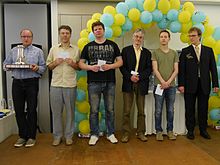Dähne Cup

Dähne-Pokal is the official name for the German Cup individual championship in chess . The winner of the Dähne Cup qualifies for the German individual championship.
Origin and history
The cup competition was initially initiated as the "Caissa Sport Magazine Cup" on April 15, 1948 by the sports journalist and chess master Paul Tröger .
The idea of transferring the cup idea popular in football to chess goes back to the Augsburg “working group” of the Caissa magazine . A means was sought to popularize the sport of chess. Therefore, the many weaker chess players should also be given a sporting opportunity to participate.
The tournament was organized by Caissa and the Nuremberg sports magazine , which put out a "German Chess Cup". The winner of this first cup tournament was Lothar Schmid , who won the final against Walter Niephaus on March 4, 1950 in Wiesbaden .
More than 1,800 players took part in this competition, which later became the Dähne Cup.
On October 7, 1951, the President of the German Chess Federation , Emil Dähne , donated a silver rook for the national winner.
After Dähne's death (1968) the cup tournament was renamed the Dähne Cup by the DSB general meeting on May 1, 1971 . The cup winner has been guaranteed participation in the German individual championship since 1952 .
Competition mode
The game is played according to the knockout system . At the federal level, 32 players take part - the 14 state associations with the largest number of members are allowed to register two participants each, the three with the weakest members (in 2004/05 these were Mecklenburg-Western Pomerania, Saarland and Bremen) and the Blind Chess Federation one each. The implementation of the state competitions is regulated by the corresponding state tournament regulations. While it is common in the smaller state associations that anyone interested can participate directly in the state competition (except in the city states, this is also the case in Schleswig-Holstein, for example), regional qualification tournaments are initially planned in the larger state associations. In North Rhine-Westphalia, for example, competitions take place at the district level, the district winners compete against each other at the association level, then the association winners at the state level. One tournament game decides on progress, in the case of a draw two blitz games are played (until 1980 the tournament game was repeated with opposite colors), if the winner is not yet determined, further blitz games are played and the next winning game decides.
For the leading chess masters and title holders, the attractiveness of the cup competition is limited by the mode of the event, as longer trips are required for individual games. The tournament usually extends over the turn of the year. Since the game year 1972/73, the following year, in which the final rounds were played, has been named as the year of the event in the list of winners of the German Chess Federation.
Winners list
- 1953: Werner Stephan
- 1954: Ludwig Röver
- 1955: Karl Gilg
- 1956: Walter Jäger
- 1957: Georg Hodakowsky
- 1958: Sigmund Wolk
- 1959: Jobst Hinne
- 1960: Sigmund Wolk
- 1961: Hans-Günter Kestler
- 1962: Dieter Mohrlok
- 1963: Karl Gilg
- 1964: Hans-Joachim Hecht
- 1965: Olaf Redlich
- 1966: Jürgen Dueball
- 1967: Rolf Bernhardt
- 1968: Rolf Bernhardt
- 1969: Rainer Oechslein
- 1970: Herbert Dietzsch
- 1971: Bodo Schmidt
- 1972: Uwe Kunsztowicz
- 1973: Friedebert Seibt
- 1974: Franz Escher
- 1975: Bodo Schmidt
- 1976: Herbert Bastian
- 1977: Peter Dankert
- 1978: Stefan Kindermann
- 1979: Rüdiger Breyther
- 1980: Herbert Vetter
- 1981: Werner Reichenbach
- 1982: Thomas Link
- 1983: Klaus-Jürgen Schulz
- 1984: Eckhard Schmittdiel
- 1985: Volkhard Rührig
- 1986: Ludger Keitlinghaus
- 1987: Thomas Martin
- 1988: Michael Mischustov
- 1989: Markus Schäfer
- 1990: Martin Fette
- 1991: Uwe Kunsztowicz
- 1992: Vladimir Gostomelsky
- 1993: Hans-Joachim Vatter
- 1994: Andreas Zach
- 1995: Martin Molinaroli
- 1996: Ewgeni Gisbrecht
- 1997: Hans-Elmar Schwing
- 1998: Sven Telljohann
- 1999: Dirk Suhl
- 2000: Karsten Müller
- 2001: Karsten Schulz
- 2002: Hannes Langrock
- 2003: Thies Heinemann
- 2004: Joachim Asendorf
- 2005: Udo Käser
- 2006: Bernd Kohlweyer
- 2007: Sven Telljohann
- 2008: Hans-Joachim Vatter
- 2009: Thomas Fiebig
- 2010: Michael Strache
- 2011: Jens Kotainy
- 2012: Vitali Braun
- 2013: Hagen Poetsch
- 2014: Dirk Paulsen
- 2015: Björn Bente
- 2016: Sven Telljohann
- 2017: Hagen Poetsch
- 2018: Hagen Poetsch
- 2019: Gordon Andre
- 2020: Igor Neyman
Individual evidence
- ^ Alfred Diel : Chess in Germany. Festival book on the occasion of the 100th anniversary of the Deutscher Schachbund e. V. 1877-1977 . Rau, Düsseldorf 1977, p. 186. ISBN 3-7919-0167-2
- ↑ Frank Große: “ In Memoriam Dr. Paul Tröger (1913-1992) ", article at Chessbase , January 12th, 2009 (with picture of the winner's cup and the final game commented by Emil Joseph Diemer )
- ↑ Deutsche Schachzeitung , June 1971, p. 181.
- ^ Otto Borik and Joachim Petzold : Meyers Schachlexikon . Meyers Lexikonverlag, Mannheim 1993, p. 210 (entry "Cup competition"). ISBN 3-411-08811-7
- ^ Engravings / plaques (until 1990) on the cup (information from Frank Hoppe); Klaus Lindörfer: Chess Lexicon. History. Theory and game practice from AZ , Orbis Verlag, Munich 1991, p. 350f. ISBN 3-572-02734-9 . In the DSB Festschrift (Alfred Diel, Festbuch on the occasion of the 100th anniversary of the German Chess Federation, 1877–1977 . Rau, Düsseldorf 1977), the winners of the game years 1961/62 to 1971/72 are assigned to the following year. see also the current list on the DSB website.


